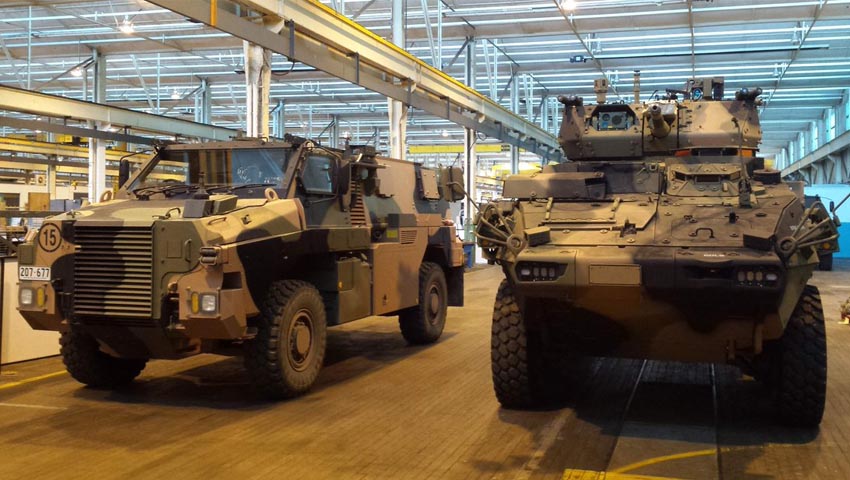Economic analysis conducted by AlphaBeta Advisers, in partnership with Thales Australia, has revealed detailed insights into the impact of how defence industry spending flows through the national economy and found significant benefits to Aussie SMEs and a strong economic benefit from sovereign industry capabilities.
To continue reading the rest of this article, please log in.
Create free account to get unlimited news articles and more!
In the first major study of its type, economic analysts AlphaBeta Advisers were given unprecedented access to data on hundreds of thousands of payments by Thales Australia to its Australian suppliers over a three-year period.
AlphaBeta lead researcher Dr Andrew Charlton said greater understanding of the value and impact of Defence spending in the Australian economy was critical as the government ramped up major acquisition programs under its Integrated Investment Program (IIP).
Dr Charlton explained, "Prime Defence contractors such as Thales are key to translating IIP spend into effective supply chain and investment programs because they provide a link between the Department of Defence’s investment and the many other Australian businesses in the supply chain, many of which may not be defence specialists."
Defence Industry Minister Melissa Price expanded on this, saying, "It has always been this government’s intention that the $200 billion we’re investing in a record build-up of defence capability flows through to the thousands of small businesses that make up our defence industry."
In developing the 2016 Defence White Paper, Defence adopted an integrated approach to bring together for the first time the key elements of investment needed to deliver and sustain Australia’s defence capabilities.
The key elements include equipment, infrastructure, information and communications technology, science and technology, and workforce.
Establishing a 10-year IIP will facilitate the whole-of-capability and whole-of-life approach to investment reflected in the implementation plan for the First Principles Review: Creating One Defence. It will also support strategy-led prioritisation of proposals and greater agility in investment decisions.
The IIP was developed through a comprehensive Force Structure Review that assessed Australia’s defence capability needs to meet the challenges of the future operating environment into the 2030s.
"This analysis by Thales demonstrates how our investments are creating local jobs, and also building the critical defence capability we need to deliver a capable, agile Defence Force. We’ve been upfront with the prime contractors about their obligations to partner with Australian businesses, and Thales is leading by example," Minister Price added.
In designing the future force, the Force Structure Review ensured alignment between defence strategy, capability and resources. The result is an affordable and balanced plan for a highly capable, agile and potent Australian Defence Force and Defence capability more broadly, to meet our future requirements.
Thales Australia CEO Chris Jenkins said the data-driven approach demonstrated there was a triple-dividend for Australia from increasing spending on Australia’s advanced industrial capabilities.
Jenkins said, "First and foremost, Australia’s sovereign defence industry capabilities are vital to delivering a capability advantage to the Australian Defence Force.
"Secondly, these sovereign industry capabilities build Australia’s self-reliance and the capability of the broader Australian advanced manufacturing sector.
"Thirdly, as this data clearly shows, there is a substantial jobs and economic activity benefit from spending more of the Defence dollar in Australia. It delivers thousands of jobs spread through hundreds of business across the nation."
Finally, Jenkins explained the importance of the findings, saying, "This analysis provides strong evidence in support of the government’s policy of requiring high levels of Australian industry capability (AIC) in its acquisition and sustainment programs. There is a strong correlation between sovereign industry capability and the greatest benefit flowing to Australian suppliers. "
Thales in Australia is a trusted partner of the ADF and is also present in commercial sectors ranging from air traffic management and ground transport systems to security systems and services.
Employing around 3,900 people, Thales in Australia recorded revenues of more than $1.39 billion in 2018 and export revenue of over $1.6 billion in the past 10 years.
Thales Australia has a history of patient investment to build advanced in-country capability across manufacturing, critical systems and services. Close collaborative relationships with local customers, Australian SME suppliers and research institutions combined with technology transfer from our global business enables Thales to tailor high quality solutions for Australian and export markets.
Stephen Kuper
Steve has an extensive career across government, defence industry and advocacy, having previously worked for cabinet ministers at both Federal and State levels.

 Login
Login








